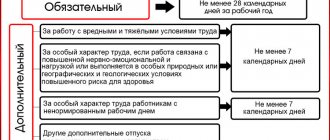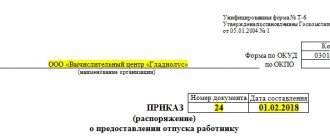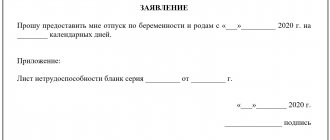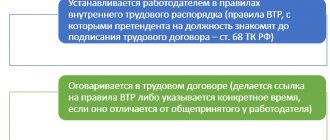Changing vacation dates at the request of the employee
A newly hired employee, after six months of continuous work, has the right, upon application, to use half of the paid rest days. By agreement with the employer, you can take all the required days off in advance. The total duration of annual leave depends on the field of activity and position held.
Something to remember! If the contractual relationship is terminated before the expiration of a year after employment, upon dismissal the overpaid amount of vacation pay will be withheld.
In mid-December, the employer draws up a priority schedule for providing paid leave for the coming year, taking into account:
- wishes of subordinates;
- preferential rights of certain categories of employees to choose a convenient period for rest at their discretion;
- production necessity.
After agreement with the trade union body (if there is one) and approval, all workers must be familiarized with the document against signature.
Immediately 2 weeks before leaving to rest according to the schedule, the personnel service inspector (or a person authorized to deal with personnel documentation) notifies the employee in writing about this, reminds the duration, date of return to work.
The employee is reminded in advance in writing about the imminent vacation
The schedule is binding on both parties to the labor relationship. The law allows for the transfer of leave at the initiative of the employee under certain circumstances, which include:
- the employee is undergoing treatment, provided there is an appropriately issued certificate of incapacity for work;
- fulfillment during the planned period of state duties providing for the release of the employee from work;
- pregnancy of the employee's spouse or birth of a child in the family;
- untimeliness of payments due before the start of the vacation;
- other life situations determined by industry legal acts and local regulations for internal use.
Family problems that force a subordinate to request the employer to reschedule leave can be taken into account by the manager at his own discretion. For example, it would be lawful for an employer to refuse to change the deadlines established by the schedule:
- in connection with the illness of a close relative and the need to care for him, since based on the medical opinion, a corresponding certificate of incapacity for work is issued;
- if the employee refers to his own upcoming wedding, the organization of the funeral of his relatives, since at this time the law allows for leave without pay.
If, at the request of the employee himself, under certain circumstances, the dates for the start of rest are postponed to another period, a written order must be issued.
The transfer of annual vacation is displayed in the vacation schedule
Employee's wish
An employee of the organization may also be interested in moving the start date of the vacation. In this case, the transfer of leave at the request of the employee occurs on the basis of a personally written application addressed to the manager.
The content of the document must reflect the following points:
- start and end dates of vacation in accordance with the schedule;
- a valid reason for the transfer;
- a link to a supporting document (if available) or a reasoned explanation of the reasons prompting the employee to request a shift in the start date of the vacation;
- the period of time for which the vacation is planned to be postponed.
If the reason for the transfer was due to reasons provided for by law, supporting documents or copies thereof should be attached to the application. This could be a sick leave certificate, a certificate of performance of government duties, etc.
The employer usually agrees to change the timing of vacation for personal reasons if this does not entail negative consequences for the company as a whole. Otherwise, the employee will go on vacation according to the approved schedule.
Transfer of leave at the initiative of the employer
Refusal to provide the annual paid leave approved according to the schedule by the employer unilaterally is recognized as a gross violation of labor law.
Transfer of vacation, according to Art. 124 of the Labor Code of the Russian Federation, is allowed in exceptional cases, if the absence of a certain specialist or employee will negatively affect the production process of the organization or the activities of the entrepreneur.
But even in such situations, the employee’s written consent must be obtained to continue working and use the allotted rest later. In any case, it must be immediately agreed upon when the employee will be able to exercise his right.
Even in emergency cases, you cannot delay by violating the schedule:
- workers who have not reached the age of majority;
- employees performing work duties in conditions recognized by the results of a special assessment as harmful and dangerous to human health.
Similarly, the employer can recall an employee who has already gone on vacation, if necessary, justified by the impossibility of doing without him, only after receiving consent.
Allotted days for rest must be provided until the end of the current year or, if desired, coincided with the next one for the year worked. Whether the vacation is transferred to the next year or will be issued later in the current calendar year must be reflected in the order and schedule.
It is prohibited not to provide annual leave for two consecutive years.
Does unused vacation expire?
To figure out whether unused vacation is burned or not in 2020 is prompted by Russia’s ratification of the International Labor Organization convention, which provides for the retention of the employee’s right to annual paid rest only for 21 months.
Additionally
Upon dismissal, the employee has the right to all previously unused vacations. This right can be exercised by providing the employee with monetary compensation for the entire accumulated period. If there are few unused days, then the employer can send the employee on vacation, and only after that can fire him.
This ratification did not entail the adoption of amendments to the Labor Code of the Russian Federation and other regulations that do not provide for any burning of unpaid vacations.
According to the letter of Rostrud dated June 8, 2007 No. 1921-6, employees who have not taken vacation for several years still have the right to use all accumulated vacation days.
According to the Labor Code, the employer is obliged to annually provide each employee with continuous leave of at least 14 calendar days. The remaining days - both for the current year and previous ones - are divided arbitrarily (Article 125 of the Labor Code). Find out how you can divide your vacation according to the labor code here. This allows the employee to periodically take 1-2 days off without leaving the workplace for an extended period, and the employer to eliminate violations of labor legislation regarding paid leaves.
Does unused vacation expire? - answer in video
Additional leave provided and the right to transfer it
The Labor Code and other laws regulating labor relations provide for additional days of paid rest, which can be confined to the main period.
Owners of enterprises, based on financial capabilities, can independently establish benefits for their subordinates, stipulating the following conditions:
- when concluding an employment contract;
- local legal acts in agreement with the trade union.
The law obliges employers to establish additional days to restore psycho-emotional and physical health:
| Type of activity or working conditions | Minimum duration of additional paid days of rest |
| The industrial risk is 2-4 degrees | 7 |
| The special nature of the work performed | determined by the list approved by the Government of the Russian Federation |
| Irregular working hours | 3 |
| In the Far North | 24 |
| In areas with climatic conditions similar to the North | 16 |
| Other northern areas | 8 |
At the request of workers, additional days can be replaced by monetary compensation if, at the discretion of the employer or the terms of legal acts, the duration is established to be more than the maximum permissible minimum.
Additional time for rest can be transferred in accordance with the procedure established by law, industry agreements, and the terms of a collective agreement.
Financial side of the issue
Naturally, if unused vacation is transferred to the next year, the question arises: is the right to legal vacation pay lost?
How is it paid?
Since the employee does not exercise his right to leave this year, payment for the agreed period is not made, the employee receives a standard monthly salary with allowances if they are due to him by virtue of the same local acts.
Is it necessary to carry forward the fund reserve to the next year?
As a rule, at the end of the current year, a reserve of funds is formed to pay for vacations for the next year, based on the number of employees and the length of their vacations.
If part of the team did not take the vacation, then the funds planned to finance the vacation will naturally be available.
And since the planned amount for next year will be calculated based on the number of employees this year, it would be more appropriate to transfer the remaining funds for unused vacations to the next year, including them in the general reserve for paying for employee vacations.
Is it possible to replace it with monetary compensation?
Article 126 of the Labor Code of the Russian Federation provides for the possibility of replacing part of the vacation with material compensation, but subject to several conditions:
- the employer’s decisions, given that he can either agree to the monetary equivalent of a vacation or refuse, given that, within the framework of the law, this issue is resolved only by agreement, and not by obligation;
- replacement with compensation only for the part of the vacation that exceeds the standard 28 days.
That is, if an employee has unused vacation for the previous year, he can receive it in monetary terms, provided that he still uses vacation for the current months in the form of vacation.
Example of vacation pay calculation
By virtue of Article 114 of the Labor Code of the Russian Federation, the employee retains his average earnings during the rest period, which is calculated on the basis of Resolution No. 922.
Decree of the Government of the Russian Federation of December 24, 2007 N 922
All types of payments that were transferred to the worker’s account over the past 12 months are taken into account, with the exception of social assistance - for example, for funeral or in connection with family problems.
Then the resulting amount is divided by 12 and 29.3, thus calculating the daily earnings, which is multiplied by the number of days of rest.
Let's say an employee's salary is: 15,000 thousand. Every month he is entitled to a 20% bonus for harmful factors and a quarterly bonus of 50%.
- 15000 x 12 = 18000
- 20% x 15000 x 12 = 36000
- 50% x 15000 x 4 = 9000
- 18000 + 36000 + 9000 = 225000
- 225000: 12 = 18750
- 18750: 29.3 = 640 rubles – daily earnings
- 28 x 640 = 17920 rubles.
- 17920 – 13% (personal income tax) = 15590.4 rubles to be issued.
Attention!
- Due to frequent changes in legislation, information sometimes becomes outdated faster than we can update it on the website.
- All cases are very individual and depend on many factors. Basic information does not guarantee a solution to your specific problems.
That's why FREE expert consultants work for you around the clock!
- via the form (below), or via online chat
- Call the hotline:
- 8 (800) 700 95 53
APPLICATIONS AND CALLS ARE ACCEPTED 24/7 and 7 days a week.
Vacation
Rules for drawing up an application
There are no standardized forms for writing to an employer with a request to change the scheduled dates.
The application is written in legible handwriting or printed using modern office equipment, certified with a personal signature. You should adhere to the requirements for a business letter.
In the upper right part of the sheet a “header” of the document is drawn up, indicating:
- to whom they are addressing - the position of the first manager, last name, initials of the first name, patronymic;
- information about the applicant - position held, place of work, last name, first name, patronymic.
Having titled the appeal, move from a new line to the text part, where:
- specify the desired period of time change for guaranteed rest;
- provide justification for the valid reasons for their request.
If there are documents directly related to the subject of the application, they are submitted along with the written request, listed in the appendix.
At the end they put a date and signature.
Requirements for the content of the order
The employer's order to change the timing of the paid vacation (or part thereof) planned according to the schedule is issued in writing in the form valid in the organization. You must specify:
- name of the enterprise acting as a legal entity;
- date of issue of the order;
- a brief thesis defining the essence of the order;
- title of the document.
The document is conventionally divided into descriptive and administrative parts with clarification:
- employee data;
- what was the reason for the request and the desired timing of the vacation;
- who is responsible for monitoring execution.
After the order is endorsed by the manager, it is registered.
The interested person is introduced to the document against personal signature.
Procedure for transferring vacation to next year
If it is necessary to change the start date of the planned annual holiday, this must be documented.
At the initiative of the employee
Step-by-step instructions for a personnel officer when receiving an application to transfer leave
After submitting a written application to change the deadlines approved by the schedule, the employer makes a decision to grant the request or refuse.
In situations provided for by law, when they are required to postpone vacation or the manager, at his discretion, does not object to changing the dates, a corresponding order is issued.
When drawing up the schedule for the next year, unused vacation time is taken into account. For example, an employee may go on sick leave due to deteriorating health conditions or injuries:
- before he was about to go on vacation;
- already resting.
In the first case, an order to grant the next paid leave is issued upon the employee’s recovery. Upon written application and agreement reached with the manager, the vacation may be postponed to another period.
When undergoing medical treatment during vacation, the employee’s right remains:
- notify the employer by any available means of receiving a certificate of incapacity for work and extend the rest by the number of days spent on sick leave;
- go to work as scheduled, and take additional days of rest at another time, upon request, to offset the vacation spent on treatment.
Sample application if the employee chose the second option
At the request of the employer
If production needs require the employee’s presence at work, the manager must notify the employee about this before the start of the scheduled leave.
Transfer of leave at the initiative of the employer is possible only with the consent of the employee
If the subordinate agrees to take the required days off later, an order is issued, with which the employee is familiarized with signature, specifying the timing of the transfer.
Sample document
Useful video
Does unused vacation expire, or can it be transferred to the next year - see the answer in the video:
Annual leave not used by an employee in the current year does not expire and can be transferred to the next year. The initiative can come from both the employee and the employer. An important condition is that mutual consent of both parties must be achieved.
To formalize the transfer, the employee needs to write a statement with a request or consent, and the employer must draw up an order and make changes to the schedule.
Features and restrictions on transferring vacation
The law provides for several types of leave that subordinates are entitled to take:
- annual paid and additional days of rest;
- without pay for certain categories of employees, under certain circumstances;
- student's;
- for child care;
- other.
Only the next paid and additional leave can be postponed and provided no later than the next calendar year - at the request of the employee or employer in the prescribed manner.
Exceptions when the employer, on his own initiative, does not have the right to change the timing of a planned vacation or recall an employee from vacation, relate to:
- minors;
- persons involved in hazardous working conditions;
- pregnant women.










